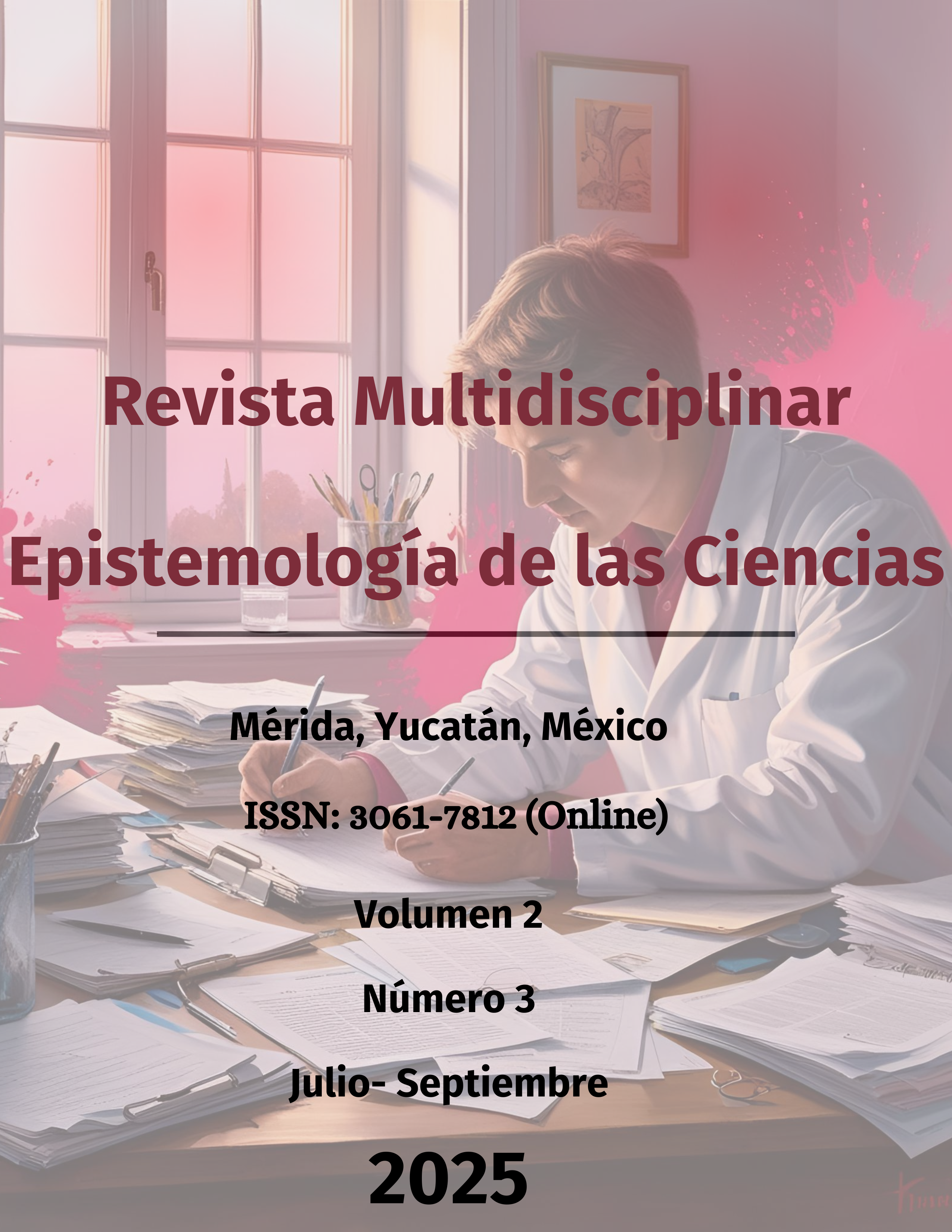The role of play as a methodological strategy in building learning in early childhood education
DOI:
https://doi.org/10.71112/pbad7z29Keywords:
Educational play, Early childhood education, Meaningful learning, Playful methodology, Fiscal institutions.Abstract
This study analyzes the role of play as a methodological strategy in the construction of learning in early childhood education in public institutions in Ecuador. A mixed-method approach with a non-experimental, cross-sectional design was applied, combining qualitative observation and interview techniques and quantitative Likert-type scales. The study involved 12 teachers and 90 children aged 4 to 5 years. The results show that play, especially in its symbolic and motor forms, is widely used by teachers and valued for its impact on attention, motivation, socio-emotional development, and conceptual understanding. However, limitations were identified in the integration of digital play and in systematic pedagogical planning. It is concluded that play represents a transformative pedagogical tool, provided it is guided by a clear didactic intention, ongoing teacher training, and institutional policies that favor its application. The study contributes to strengthening the playful approach as the basis for meaningful learning in childhood.
Downloads
References
Andrade Peña, O. del R., Cuenca Zambrano, M. M., García Montenegro, S. J., Cuamacás Chafuelán, S. M., & Ramos Arias, E. A. (2023). El juego como herramienta pedagógica en la educación inicial en contextos latinoamericanos. Revista Imaginario Social, 6(2), 55–70. https://doi.org/10.5281/zenodo.10034521
Antón, M. C. M. (2025). La importancia del juego como estrategia pedagógica en la educación inicial. Revista Sinergia Académica, 7(1), 22–35. https://sinergiaacademica.com/index.php/sa/article/view/617
Bósquez León, D. M., Cachupud Morocho, L. A., & Chica Macay, S. M. (2024). Estrategias lúdicas: Un enfoque dinámico para fomentar el desarrollo cognitivo en la educación inicial. Revista Scientific, 9(31), 108–125. https://doi.org/10.29394/Scientific.issn.2542-2987.2024.9.31.5.108-125 DOI: https://doi.org/10.29394/Scientific.issn.2542-2987.2024.9.31.5.108-125
Braun, V., & Clarke, V. (2021). Thematic analysis: A practical guide. SAGE Publications.
Bravo, B. J. P., Cornelio, O. M., Rodríguez, A. R., Solórzano Álava, W. L., Amén Mora, P. G., & Santos Mera, L. M. (2024). La inteligencia artificial: Desafíos para la educación. Editorial Internacional Alema. https://editorialalema.org/libros/index.php/alema/article/view/34
Cedeño, A., & Navarrete, G. (2023). La gamificación como recurso para fortalecer el aprendizaje en educación básica. Revista Ciencia y Educación, 7(2), 55–69.
Chamba, A., & Romero, S. (2023). Aplicación de técnicas mixtas en estudios pedagógicos de educación inicial. Revista Polo del Conocimiento, 8(4), 41–58. https://polodelconocimiento.com/ojs/index.php/es/article/view/8575
Creswell, J. W., & Guetterman, T. C. (2022). Educational research: Planning, conducting, and evaluating quantitative and qualitative research (6th ed.). Pearson.
Flick, U. (2023). Introducing research methodology: A beginner’s guide to doing a research project (4th ed.). SAGE.
García, R., & Torres, M. (2022). Brechas digitales en el nivel preescolar: Desafíos para el uso del juego digital. Revista Científica Conocimientos, 10(1), 55–70.
Gibbs, G. R. (2023). Analyzing qualitative data (2nd ed.). SAGE Publications.
Guzmán, V. R. P. (2025). El juego como herramienta pedagógica en la educación inicial. Polo del Conocimiento, 10(3), 83–98. https://polodelconocimiento.com/ojs/index.php/es/article/view/9108
Hernández, R., Fernández, C., & Baptista, P. (2023). Metodología de la investigación (7.ª ed.). McGraw-Hill Interamericana.
López, J., Muñoz, A., & Tenesaca, C. (2022). El juego como estrategia activa en el aula de inicial. Revista Saberes Pedagógicos, 14(2), 120–134.
Luna, C., & Robalino, G. (2023). Juego y aprendizaje: Perspectivas docentes en educación inicial. Revista Intercultural de Pedagogía, 9(2), 33–49.
Mero, A., Zambrano, F., & Rodríguez, C. (2020). Teaching–learning strategies in initial education. PalArch’s Journal of Archaeology of Egypt/Egyptology, 17(6), 13214–13227. https://archives.palarch.nl/index.php/jae/article/view/9456
Ministerio de Educación del Ecuador. (2023). Currículo de educación inicial (Acuerdo Ministerial MINEDUC-ME-2023-00066-A). https://educacion.gob.ec
Pacheco, S., & Rosero, M. (2023). Formación docente y juego pedagógico en contextos rurales. Educación y Diversidad, 7(1), 44–59.
Pramling Samuelsson, I. (2023). The relation of play and learning empirically studied and conceptualized over 40 years. Early Years, 43(2), 115–130. https://doi.org/10.1080/09669760.2022.2079075 DOI: https://doi.org/10.1080/09669760.2022.2079075
Rivera, M., Herrera, D., & Lema, V. (2023). Prácticas lúdicas en educación inicial: Análisis desde el enfoque socioeducativo. Revista Latinoamericana de Estudios Educativos, 5(2), 98–113.
Rodríguez, I. K. R. (2025). El juego como estrategia pedagógica en la enseñanza de niños a partir de una revisión sistemática. Revista Invecom. https://dialnet.unirioja.es/descarga/articulo/10280125.pdf
Rojas, L., Quishpe, D., & Cedillo, A. (2023). Técnicas estadísticas aplicadas a estudios educativos en contexto latinoamericano. Educación y Sociedad, 8(1), 112–130.
Salgado, L., García, M., & Pozo, T. (2024). Estudios mixtos en educación: Una propuesta metodológica para comprender la complejidad del aprendizaje. Innova Research Journal, 9(1), 22–38.
Salvatierra, S. M. Z. (2025). Estrategia didáctica basada en juegos para el desarrollo de la autonomía en preescolares de 4 años en una escuela fiscal del Ecuador. Maestro y Sociedad, 22(1), 45–60. https://maestroysociedad.uo.edu.cu/index.php/MyS/article/view/6787
UNESCO. (2023). Aprender jugando: Marco global para integrar el juego en la educación inicial. UNESCO. https://unesdoc.unesco.org/ark:/48223/pf0000385211
Valdivieso, M., & Torres, C. (2025). Gamificación y educación inclusiva: Un análisis en contextos fiscales. Revista Docencia y Transformación, 3(2), 33–47.
Vega, M., & Salazar, I. (2022). Uso del análisis temático para la comprensión de fenómenos sociales en educación. Revista Conrado, 18(90), 79–88. https://conrado.ucf.edu.cu/index.php/conrado/article/view/2572
Vélez, A., & Paredes, R. (2023). Impacto de las estrategias lúdicas en valores y competencias en el nivel inicial. Revista Educación Integral, 9(1), 92–108.
Villavicencio, R. (2024). Plataformas gamificadas y formación docente: Una relación necesaria. Revista Digital Innovación Educativa, 12(4), 18–32.
Downloads
Published
Issue
Section
License
Copyright (c) 2025 Multidisciplinary Journal Epistemology of the Sciences

This work is licensed under a Creative Commons Attribution 4.0 International License.











